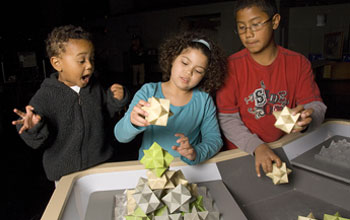Media Advisory 12-005
Experts Come Together at Pacific Science Center to Transform Mathematics and Science Education
National Science Foundation sponsors workshop to share best practices for reforming science, technology, engineering and mathematics (STEM) education in districts and schools

Recommendations include devoting adequate instructional time and resources for K-5th grade science.
February 21, 2012
This material is available primarily for archival purposes. Telephone numbers or other contact information may be out of date; please see current contact information at media contacts.
At the National Science Fair earlier this month, President Obama invited winners of student science fairs to the White House to recognize the importance of their work.
"When you work and study and excel at what you're doing in math and science," he told the honorees, "when you compete in something like this, you're not just trying to win a prize today. You're getting America in shape to win the future. You're making sure we have the best, smartest, most skilled workers in the world, so that the jobs and industries of tomorrow take root right here."
Making the connection between students' early experiences in science, technology, engineering and mathematics (STEM) and the country's future innovation and competitiveness is increasingly important. As reported in the National Science Board's Science and Engineering Indicators, there is increasing competition around the world in producing and employing scientists and engineers. Meanwhile, international assessments show many foreign students outperforming American students in mathematics and science.
Improving STEM education in K-12 classrooms is the topic of an NSF-funded report and the focus of a series of regional meetings to bring its recommendations to states, districts and schools. Seattle will be the site of the first regional meeting, where research scientists, education researchers and educators will share best practices; highlighted programs are supported by NSF. Details on the event follow:
| What: | STEM Smart: Lessons Learned from Successful Schools A workshop hosted by the National Science Foundation |
| When: | Tuesday, Feb. 28, 2012, 8:00 a.m. - 4:45 p.m. |
| Where: | Pacific Science Center 200 Second Avenue North Seattle, WA 98109 |
Media interested in attending and/or interviewing the educators in attendance should contact Maria Zacharias at mzachari@nsf.gov or (703) 292-8454
A list of presenters , an agenda and further details are on the Successful STEM Education Web site.
-NSF-
Media Contacts
Maria C. Zacharias, NSF, (703) 292-8454, email: mzachari@nsf.gov
Wendy Malloy, Pacific Science Center, (206) 443-2879, email: wmalloy@pacsci.org
The U.S. National Science Foundation propels the nation forward by advancing fundamental research in all fields of science and engineering. NSF supports research and people by providing facilities, instruments and funding to support their ingenuity and sustain the U.S. as a global leader in research and innovation. With a fiscal year 2023 budget of $9.5 billion, NSF funds reach all 50 states through grants to nearly 2,000 colleges, universities and institutions. Each year, NSF receives more than 40,000 competitive proposals and makes about 11,000 new awards. Those awards include support for cooperative research with industry, Arctic and Antarctic research and operations, and U.S. participation in international scientific efforts.
Connect with us online
NSF website: nsf.gov
NSF News: nsf.gov/news
For News Media: nsf.gov/news/newsroom
Statistics: nsf.gov/statistics/
Awards database: nsf.gov/awardsearch/
Follow us on social
Twitter: twitter.com/NSF
Facebook: facebook.com/US.NSF
Instagram: instagram.com/nsfgov


